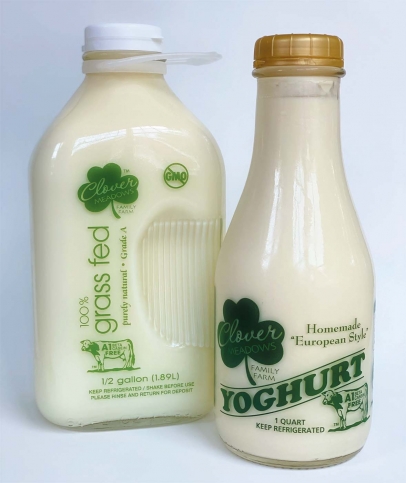Come Back to Milk
Milk. It does a body good…when you are able to drink it without ill effects. Dairy farmer Joseph Zaiger is familiar with the side effects cow’s milk can bring on in some people – two of his children were diagnosed as dairy intolerant. When he learned about cows that produce “A2 milk”, or A1 beta-casein-free milk, he started researching breeds with the genes and the benefits of this natural and potentially better option for his family.
Born and raised in Pennsylvania, Zaiger, now 37, grew up learning construction from his father and conventional dairy farming from his brother. When he and his then fiancée moved to her home state of Wisconsin, Joseph worked as a plumber for several years before deciding in 2013 to find a career he could work at from home with his family.
“To start out dairy farming conventionally, that takes a lot of assets,” Zaiger said, of choosing to begin with a small herd and farming biodynamically.
“We wanted to raise animals that would give us more of a premium for our product on a small scale.”
The Zaigers named their farm Clover Meadows Family Farm, for its location among the rolling meadows of Marathon County, outside the Village of Athens. They started with 12 cows, bottling their own milk and adding more cows each year. They have reached their comfort level with 40 animals.
Clover Meadows Farm is currently thriving with a “Heinz 57” herd of heritage cow breeds. Zaiger said right now their cows are mostly Holsteins and Jerseys. He’s been adding Friesians, due to their tendency toward being a beefier, lower maintenance animal with good resale value.
Those three breeds of bovine at Clover Meadows Farm have been genetically tested by a certified lab and selected for their production of only A2 beta-casein milk. Genes determine the type of beta-casein protein cows produce in their milk. Most modern cows produce A1 beta-casein proteins, which have been subject to scientific studies (mostly in Europe and Australia) and are being blamed for milk intolerance and allergic reactions. One paper published in 2007 in New Zealand by author and Professor Keith Woodford, linked A1 milk to health issues such as Type 1 diabetes, heart disease and autism. Proponents have touted A2 milk as the ‘original’ milk, considering that all mammals, including humans, and except for modern cows, produce only A2 milk.
Some people claim to be lactose intolerant, but we think many people may actually be A1 beta-casein intolerant. – Joseph Zaiger
“Some people claim to be lactose intolerant, but we think many people may actually be A1 beta-casein intolerant. So, people turn to alternative milks (almond, soy, cashew), or no milk at all. Our A2 milk gives people an option to get the nutrients milk provides, like vitamins A, D and K2, beta carotene and omega-3 fatty acids.
“There is no taste difference between A1 or A2 milk,” Zaiger emphasized. “A2 milk does not cost more to produce, a farmer only has to genetically select the cows and her sires.”
More and more farmers are jumping on the A2 bandwagon, spurred by consumers demanding healthier milk without the side effects. Clover Meadows Farm practices biodynamic farming, raising their own feed using natural foliar fertilizers and not using pesticides; grazing their animals outside on pasture in the summer, and keeping them cozy and loose in a barn during Wisconsin winters. Zaiger’s animals are 100 percent grass fed, which he said gives the milk his cows produce a better flavor.
“By not feeding our animals grain, the omega-3 fatty acid profile of their milk changes, resulting in higher omega-3s and CLAs (conjugated linoleic acids), and making the milk taste better,” Zaiger explained. “We also don’t homogenize our milk, or separate the cream off.
“We don’t use hormones, and everything on our farm is done organically. But we’re not certified organic. It’s better to know your farmer and know that your famer spends his time taking care of his animals, than he does jumping through red tape.”
Milk from Clover Meadows Farm is treated with low temperature pasteurization “the lowest temperature allowed”, says Zaiger, which keeps the healthy enzymes active. Their creamy milk is sold in glass bottles, and the family also makes a selection of plain and flavored “European Style” yoghurts. Until June 2021, all milk was processed and bottled on Clover Meadows Farm. However, the workload got to be too much so the Zaiger family joined forces with a neighboring family who recently constructed a more efficient processing facility than the Zaiger’s.
“It’s still our milk, and still processed on a farmstead creamery. This way they can work together as a family and we can continue to work together as a family, too.
“If milk drinkers want to do good for the environment and support farming families, please put your purchasing power toward this type of cause,” Zaiger pleaded. “A common thought is that farming is bad for the environment. Conventional farming can be, but please don’t lump all of us in that category. Milking cows like this helps lower our farms’ carbon footprint. It’s good for the environment. And our environment is good for the cows, too.”
Clover Meadows milk and yoghurt are distributed by Trust Local Foods, near Appleton, which markets the products throughout Northeastern Wisconsin.





